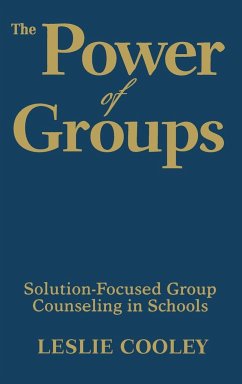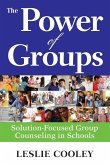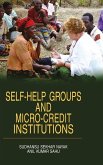- Gebundenes Buch
- Merkliste
- Auf die Merkliste
- Bewerten Bewerten
- Teilen
- Produkt teilen
- Produkterinnerung
- Produkterinnerung
Research-based and practical, this guide gives school professionals the theory and knowledge to adapt solution-focused brief counseling for student groups on any topic, curriculum, or grade level.
Andere Kunden interessierten sich auch für
![Power of Groups Power of Groups]() Leslie CooleyPower of Groups41,99 €
Leslie CooleyPower of Groups41,99 €![Mental Differences in Certain Immigrant Groups Psychological Tests of South Europeans in Typical Ca Mental Differences in Certain Immigrant Groups Psychological Tests of South Europeans in Typical Ca]() Kimball YoungMental Differences in Certain Immigrant Groups Psychological Tests of South Europeans in Typical Ca35,99 €
Kimball YoungMental Differences in Certain Immigrant Groups Psychological Tests of South Europeans in Typical Ca35,99 €![Self-Help Groups and Micro Credit Institutions Self-Help Groups and Micro Credit Institutions]() S. S. NayakSelf-Help Groups and Micro Credit Institutions34,99 €
S. S. NayakSelf-Help Groups and Micro Credit Institutions34,99 €![MICRO FINANCING OF RURAL WOMEN THROUGH SELF-HELP GROUPS MICRO FINANCING OF RURAL WOMEN THROUGH SELF-HELP GROUPS]() K. KanniammalMICRO FINANCING OF RURAL WOMEN THROUGH SELF-HELP GROUPS46,99 €
K. KanniammalMICRO FINANCING OF RURAL WOMEN THROUGH SELF-HELP GROUPS46,99 €![Micro-Finance and Self-Help Groups Micro-Finance and Self-Help Groups]() Edwin GnanadhasMicro-Finance and Self-Help Groups37,99 €
Edwin GnanadhasMicro-Finance and Self-Help Groups37,99 €![Will using interaction in small groups about homework assignments increase students¿ completion of homework assignments? Will using interaction in small groups about homework assignments increase students¿ completion of homework assignments?]() Johannes VeesWill using interaction in small groups about homework assignments increase students¿ completion of homework assignments?17,95 €
Johannes VeesWill using interaction in small groups about homework assignments increase students¿ completion of homework assignments?17,95 €![Learning in Groups Learning in Groups]() David JaquesLearning in Groups253,99 €
David JaquesLearning in Groups253,99 €-
-
-
Research-based and practical, this guide gives school professionals the theory and knowledge to adapt solution-focused brief counseling for student groups on any topic, curriculum, or grade level.
Hinweis: Dieser Artikel kann nur an eine deutsche Lieferadresse ausgeliefert werden.
Hinweis: Dieser Artikel kann nur an eine deutsche Lieferadresse ausgeliefert werden.
Produktdetails
- Produktdetails
- Verlag: Corwin
- Seitenzahl: 194
- Erscheinungstermin: 1. Juni 2009
- Englisch
- Abmessung: 235mm x 157mm x 15mm
- Gewicht: 440g
- ISBN-13: 9781412970969
- ISBN-10: 1412970962
- Artikelnr.: 26014627
- Herstellerkennzeichnung
- Books on Demand GmbH
- In de Tarpen 42
- 22848 Norderstedt
- info@bod.de
- 040 53433511
- Verlag: Corwin
- Seitenzahl: 194
- Erscheinungstermin: 1. Juni 2009
- Englisch
- Abmessung: 235mm x 157mm x 15mm
- Gewicht: 440g
- ISBN-13: 9781412970969
- ISBN-10: 1412970962
- Artikelnr.: 26014627
- Herstellerkennzeichnung
- Books on Demand GmbH
- In de Tarpen 42
- 22848 Norderstedt
- info@bod.de
- 040 53433511
Leslie Cooley worked as a school psychologist in public schools for 20 years. Initially hired in 1978 to facilitate counseling groups, she approached the task with enthusiasm and massive naivete as she had little training in group counseling. Based on her natural optimism and easy way of relating to students, she developed a variety of skills and techniques that were closely related to the later work of the innovators of solution-focused counseling. That was 1978 to 1983. Since that time, Cooley has earned a PhD and is a licensed clinical psychologist in California. In the 1990s, she transitioned from working in the schools to teaching at the graduate level in school psychology at California State University, Sacramento. Her mission was to surreptitiously infiltrate the school system with what were once radical ideas about building on strengths. In that, she has been successful... successfully mainstream! Solution-focused strategies are no longer radical, and books like Seligman's Positive Psychology have become bestsellers. Cooley continues to do a limited psychotherapy practice with a focus on families and she continues to believe that most of the problems kids develop can be successfully managed at the school level, where any intervention is less intrusive than a referral to someone outside the school. As a graduate school trainer in school psychology, Cooley has been teaching group counseling to school psychologists for over a decade. She is systematically robbing graduate students of the character-building experience that she had scrambling to learn to run groups in the schools. However, in the schools today, there is plenty to scramble about already!
Preface
Acknowledgments
About the Author
1. Creating Change One Group at a Time
Facilitating Change
An Equation for Change
The Importance of a Theoretical Model
Choosing a Foundation: An Exploration of Models
Practitioner Training
Summary
2. Solution-Focused Counseling: A Primer
The School as a System
The Assumptions of Solution-Focused Brief Counseling
Conclusions
Summary
3. Turning a Solution-Focused Attitude Into Practice
What Happens if I Do Something Wrong?
Techniques and Strategies of Solution-Focused Counseling
Summary
4. Adapting Group Curriculum Material: General Principles
Choosing an Activity
Make It Your Own
Creating a Safe Environment
Summary
5. Adapting Group Curriculum Material: Specific Strategies
Group Discussion
Goal Setting
The Role of Questions
Summary
6. From Ideas to Action: Planning and Preparation
Getting Referrals
Permission Letters
Setting Up the Group
Pre- and Postevaluation Surveys
Handling Pressure
Summary
7. From Ideas to Action: Getting the Group Up and Running
At the First Meeting
Keeping the Group Afloat
Successful Ways to End a Group
Summary
8. Group Agendas: A Sampling
Elementary Level: Making Friends, Sessions 1 Through 3
Middle School: Handling Pressure, Sessions 4 Through 6
High School: Making Decisions and Life Goals, Sessions 7 Through 9
Summary
9. Troubleshooting
Potential Snags
Intervention Ideas
Self-Evaluation
Summary
10. The Power of Groups
The Students
The Process
The Leader
References
Index
Acknowledgments
About the Author
1. Creating Change One Group at a Time
Facilitating Change
An Equation for Change
The Importance of a Theoretical Model
Choosing a Foundation: An Exploration of Models
Practitioner Training
Summary
2. Solution-Focused Counseling: A Primer
The School as a System
The Assumptions of Solution-Focused Brief Counseling
Conclusions
Summary
3. Turning a Solution-Focused Attitude Into Practice
What Happens if I Do Something Wrong?
Techniques and Strategies of Solution-Focused Counseling
Summary
4. Adapting Group Curriculum Material: General Principles
Choosing an Activity
Make It Your Own
Creating a Safe Environment
Summary
5. Adapting Group Curriculum Material: Specific Strategies
Group Discussion
Goal Setting
The Role of Questions
Summary
6. From Ideas to Action: Planning and Preparation
Getting Referrals
Permission Letters
Setting Up the Group
Pre- and Postevaluation Surveys
Handling Pressure
Summary
7. From Ideas to Action: Getting the Group Up and Running
At the First Meeting
Keeping the Group Afloat
Successful Ways to End a Group
Summary
8. Group Agendas: A Sampling
Elementary Level: Making Friends, Sessions 1 Through 3
Middle School: Handling Pressure, Sessions 4 Through 6
High School: Making Decisions and Life Goals, Sessions 7 Through 9
Summary
9. Troubleshooting
Potential Snags
Intervention Ideas
Self-Evaluation
Summary
10. The Power of Groups
The Students
The Process
The Leader
References
Index
Preface
Acknowledgments
About the Author
1. Creating Change One Group at a Time
Facilitating Change
An Equation for Change
The Importance of a Theoretical Model
Choosing a Foundation: An Exploration of Models
Practitioner Training
Summary
2. Solution-Focused Counseling: A Primer
The School as a System
The Assumptions of Solution-Focused Brief Counseling
Conclusions
Summary
3. Turning a Solution-Focused Attitude Into Practice
What Happens if I Do Something Wrong?
Techniques and Strategies of Solution-Focused Counseling
Summary
4. Adapting Group Curriculum Material: General Principles
Choosing an Activity
Make It Your Own
Creating a Safe Environment
Summary
5. Adapting Group Curriculum Material: Specific Strategies
Group Discussion
Goal Setting
The Role of Questions
Summary
6. From Ideas to Action: Planning and Preparation
Getting Referrals
Permission Letters
Setting Up the Group
Pre- and Postevaluation Surveys
Handling Pressure
Summary
7. From Ideas to Action: Getting the Group Up and Running
At the First Meeting
Keeping the Group Afloat
Successful Ways to End a Group
Summary
8. Group Agendas: A Sampling
Elementary Level: Making Friends, Sessions 1 Through 3
Middle School: Handling Pressure, Sessions 4 Through 6
High School: Making Decisions and Life Goals, Sessions 7 Through 9
Summary
9. Troubleshooting
Potential Snags
Intervention Ideas
Self-Evaluation
Summary
10. The Power of Groups
The Students
The Process
The Leader
References
Index
Acknowledgments
About the Author
1. Creating Change One Group at a Time
Facilitating Change
An Equation for Change
The Importance of a Theoretical Model
Choosing a Foundation: An Exploration of Models
Practitioner Training
Summary
2. Solution-Focused Counseling: A Primer
The School as a System
The Assumptions of Solution-Focused Brief Counseling
Conclusions
Summary
3. Turning a Solution-Focused Attitude Into Practice
What Happens if I Do Something Wrong?
Techniques and Strategies of Solution-Focused Counseling
Summary
4. Adapting Group Curriculum Material: General Principles
Choosing an Activity
Make It Your Own
Creating a Safe Environment
Summary
5. Adapting Group Curriculum Material: Specific Strategies
Group Discussion
Goal Setting
The Role of Questions
Summary
6. From Ideas to Action: Planning and Preparation
Getting Referrals
Permission Letters
Setting Up the Group
Pre- and Postevaluation Surveys
Handling Pressure
Summary
7. From Ideas to Action: Getting the Group Up and Running
At the First Meeting
Keeping the Group Afloat
Successful Ways to End a Group
Summary
8. Group Agendas: A Sampling
Elementary Level: Making Friends, Sessions 1 Through 3
Middle School: Handling Pressure, Sessions 4 Through 6
High School: Making Decisions and Life Goals, Sessions 7 Through 9
Summary
9. Troubleshooting
Potential Snags
Intervention Ideas
Self-Evaluation
Summary
10. The Power of Groups
The Students
The Process
The Leader
References
Index








